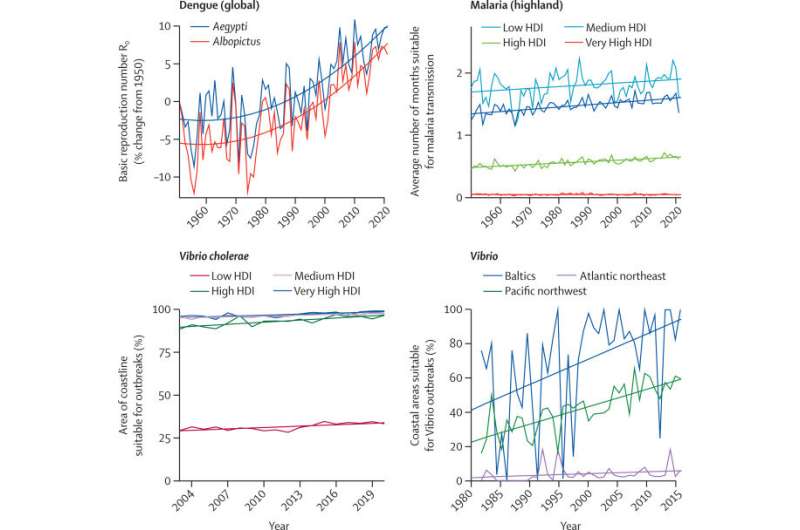Transitioning to net-zero emissions could be the greatest health opportunity of this century

Climate change threatens to undermine the health of people around the world, with more intense and frequent extreme weather events, increased heatwave exposure, climate-related food insecurity, alteration in the spread of infectious diseases and exacerbated mental ill-health.
These are just some of the findings of the 2022 report of The Lancet Countdown on Health and Climate Change, published in The Lancet.
This report represents the contributions of 99 researchers across 51 academic institutions and United Nations agencies and is accompanied by regional reports including the 5th annual MJA–Lancet Countdown on health and climate change, which presents the latest evidence on climate change and health here in Australia.
These reports are published in a world with compounding crises of energy, cost-of-living and the ongoing COVID-19 pandemic.
They identify how climate change impacts are affecting the health of people and populations, the consequences of delayed climate action and the health benefits of phasing out fossil fuels.
This year's global Lancet Countdown finds that:
- heat-related mortality for people over 65 has increased by two-thirds over the last two decades
- increasing global land area is affected by extreme drought
- climate suitability is rising for the spread of infectious diseases such as dengue and malaria
- dirty fuels still dominate domestic energy use, leading to unhealthy indoor air quality.
In 2021, carbon dioxide emissions from fossil fuel combustion rebounded to a record high, after COVID-related decreases in 2020, but government subsidies for fossil fuels are often comparable to or exceed their health budgets.
There are immediate and long-term benefits of climate action, not only for Earth's climate but for the health of people and populations. For example, this year's report finds that:
- improved air quality through cutting fossil fuel combustion could prevent 1.2 million deaths annually
- increased urban greenspace can reduce urban heat and improve the air quality of cities
- low-carbon, plant-rich diets could prevent up to 11.5 million diet-related deaths annually and reduce the risk of zoonotic infectious diseases like COVID-19.
It's grim reading, but there are signs of hope.
Globally, total clean energy generation reached record-high levels in 2020, and zero-carbon sources accounted for 80 percent of investment in electricity generation in 2021. For the first time, direct and indirect employment in renewables exceeded direct employment in fossil fuel extraction industries.
And an increasing number of countries have committed to low-or net zero-carbon health systems.
There's also growing momentum to fast-track the transition to clean and renewable energy sources, partly because it is crucial for a healthy and sustainable future.
The World Health Organization (WHO) recently joined health professionals and organizations from around the world in calling for an urgent Fossil Fuel Non-Proliferation Treaty—an international agreement to control substances that harm human health—like coal, oil and gas.
WHO Director-General Dr. Tedros Adhanom Ghebreyesus calls our addiction to fossil fuels "an act of self-sabotage" on our health.
The WHO also released a Manifesto for a Green and Healthy Pandemic Recovery, which calls on governments and industry to protect and preserve the source of human health—nature; to invest in essential services, from water and sanitation to clean energy in healthcare facilities; and to ensure a quick, healthy energy transition.
Governments in Wales, Scotland and New Zealand are moving towards a "Wellbeing Economy," looking beyond gross domestic product (GDP) to a more comprehensive understanding of links between human health, well-being, ecology and prosperity.
In a promising sign, some Australian policy-makers and organizations have motioned towards this perspective, which has the potential to build healthier and more equitable and sustainable economies for people and the planet.
This perspective is important because in Australia we are increasingly exposed to excess heat, extreme weather and other climate risks.
For example, if we look at data on ambulance demand, hospital admissions and mortality, it highlights the health risks from heatwave exposure—particularly among people aged over 65 years, with pre-existing health problems living in urban areas.
Australia's transition to renewables and zero-carbon remains unacceptably slow. Our emissions reduction target is insufficient and inconsistent with the goal of limiting global warming to 1.5°C.
There are no strategies to mitigate the carbon emissions and toxic pollution arising from internal combustion engines, and electric vehicles comprise only two percent of new car sales.
And there is action at the State level. For example, Victoria has recently published a Health and Human Services Climate Change Adaptation Action Plan (2022–2026).
As countries and populations deal with compounding crises, we are at a critical juncture. Adapting to the impacts of climate change is imperative.
Countries must meet or exceed their pledges to reduce emissions and deliver a world where warming is limited to less than 2°C, and where people can lead healthy lives.
Tackling climate change and transitioning to net-zero emissions could be the greatest health opportunity of this century.
More information: Marina Romanello et al, The 2022 report of the Lancet Countdown on health and climate change: health at the mercy of fossil fuels, The Lancet (2022). DOI: 10.1016/S0140-6736(22)01540-9




















